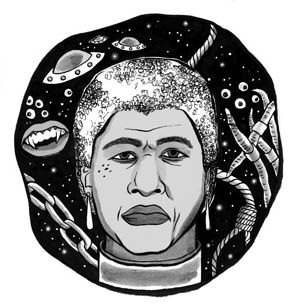Serendip is an independent site partnering with faculty at multiple colleges and universities around the world. Happy exploring!
Week Thirteen (Mon, 4/18): Bloodchild
![]()
T'Gatoi from Bloodchild: "I was going for was a mix of shock, sadness and pain. Essentially, it's in the scene where Gan is holding a rifle in his hands."
I. coursekeeping
notekeepers: shin1068111 & Hilary_B
for Wednesday, watch TRON: Legacy;
also come to class ready to tell us
what performance group you will be in
by Friday @ midnight, your last 4-pp. web event is due

II. your thoughtful postings re: Chorost,
integrating humanity, machines (and the internet):
m.aghazarian's catalogue towards answering the question
How DOES technology diminish the quality of communication?
cara: I think the same traits that allow newer technology (computers, cellphones, etc) to help us become more efficient and more broadly connected also diminish the quality of face-to-face communication
Riki: I was wondering if a connection of minds would be effective for talk therapy… part of the therapeutic power/process is for someone to verbalize their perceptions of their world and themselves, so wouldn’t a direct mental connection between therapist and client damage that part of the process?
vgaffney: “It will never be possible to experience the world exactly the way another brain does” (Chorost, 13).
kgould: Can technology correct disability? Does it remove or negate a disabled identity?
Or: how important (essential??) is inefficiency, incompleteness, lack of understanding, to our both "slowing down" and "staying connected"? (thinking here about the QWERY phenomenon Mike told us about; also this from Paul Grobstein, in a long-ago conversation about "The Two Cultures":
In a class session devoted to analysis of some poems...the conversation turned to the question of differences between "languages". If indeed there were highly unambiguous "languages" (mathematics, as well as, for example, computer programming languages), how come ordinary "language" was invariably highly "ambiguous" in interpretation (so much so that poetry was a legitimate art form and "literary criticism" a legitimate profession, with a method not dissimilar from "science")? What emerged from the discussion was the idea that ordinary language is not "supposed" to be unambiguous, because its primary function is not in fact to transmit from sender to receiver a particular, fully defined "story". Ordinary language is instead "designed" (by biological and cultural evolution) to perform a more sophisticated, bidirectional communication function. A story is told by the sender not to simply transmit the story but also, and equally importantly, to elicit information from/about the receiver, to find out what is otherwise unknowable by the sender: what ideas/thoughts/perspectives the receiver has about the general subject of the story. An unambiguous transmission/story calls for nothing from the receiver other than what the transmitter already knows; an ambiguous transmission/story links teller/transmitter and audience/receiver in a conversation (and, ideally, in a dialectic from which new things emerge).
III. the importance of ambiguity in evoking new knowledge is very related to our exercise in observing, then interpreting, Teknolust (and your inability to disentangle the two). We got pretty tangled up by the end of class, so we want to try and disentangle this a bit....
observations are inevitably determined by prior interpretations
(what you noticed in the film was influenced by your watching it
for this class on GIST, etc.)
this is like Barad's "cut": what you can see is determined by
the instruments you use; as an anthro student in my other class
said last week (quoting Ruth Benedict),
“No man ever looks at the world with pristine eyes.
He sees it edited by a definite set of customs and institutions
and ways of thinking."
given that inevitability, it's all the more important for us to
be aware of the process, to slow it down and try make "observations"
that are less bound to what we already know, to try and see beyond
our cultural limitations, our expectations of what we think is there
(one reason to be in a class w/ people who think differently!)
LIZ: where did we (or might we) arrive @, in
the process of interpreting this film together?
IV. trying this again with Octavia Butler's "Bloodchild"!

smile: What really attracts me in The film [Teknolust] is the human part…should they call her Mum or old sister? …these are just names of Human relationships… the 3 SRA`s were showing a kind of fear for each other, and also taking care of each other...
tangerines: I thought it was weird that this movie seemed to regurgitate stereotypes of women. … Perhaps this reliance on sexist tropes is itself a commentary on the human tendency to rely on what we know rather than exploring new possibilities in any field, whether gender/sexuality, science, technology, etc.
spreston: Looking at the dependency issues that arise in Teknolust also made me think back to the Chorost excerpts we read. If humans become more linked to technology, will this just create even more dependence in our lives?… is it wise to… make us even less independent?
leamirella: This concept of being "human" is something, that I believe, is constantly changing.
So: here's another story about relationships, and dependence, that explores new possibilities, changes in being human.... How do we interpret it, in light of the rubrics of our course?
Years ago, I picked "Bloodchild" to anchor a session on diversity (and recommended it several years before that, to the deans planning the pluralism workshop for first-year students), because I thought it might be a way of getting us beyond the by-now so-predictable menu of race/class/ethnicity/sexual orientation/religion/physical/mental ability, particularly the difference of race, and most particularly the binary of black-white . . . all of which I hoped would be preparatory to looping back to such matters.
In her commentary on The Left Hand of Darkness, "Is Gender Necessary?" Ursula LeGuin talks about science fiction as a heuristic device, a thought-experiment: "The experiment is performed, the question is asked, in the mind . . . . [Science fiction is] simply a way of thinking. One of the essential functions of science fiction is question-asking: a reversal of habitual ways of thinking, metaphors for what our language has no words for as yet, experiments in imagination."
To me, the subject of Butler's experiment in "Bloodchild" looks something like this: because of our lifelong social conditioning, because of some genetic equipment we/I don't understand very well yet (structures built into the unconscious that incline us to take note of difference, to put others into categories that have an ideal, a norm, AND probably to prefer what is the same, familiar, known...) it's hard for us to see clearly both how USEFUL our differences can be to one another--and how bound up those usefulnesses are with the costs/dangers. I thought that re-figuring this dynamic with two alien species (one of which plants eggs inside the bodies of the others, where they grow into worms, then children, and where the host species is, in return, cared for, given a home) might help us break out of the habitual ways of talking about the costs and value of diversity on THIS planet/this campus...
In her "Afterword" to "Bloodchild," Butler calls it
- a love story between two very different beings
- a coming-of-age story in which a boy uses disturbing information to make a decision
- her "pregnant man" story, in which a man becomes pregnant
--not out of misplaced competition (to show he can do what women do),
--not because he was forced, not even out of curiosity, but
--as an act of love and
- (most importantly for our purposes) as "a story about paying the rent": "about an isolated colony of human beings on an inhabited, extrasolar world . . . [who] have to make some kind of accomodation with their . . . hosts."
I thought the relevant question here is Butler's asking what WE have that we could "trade for a liveable space on a world not our own?" Or, as the August 15, 2003 Chronicle article,
"Ten Questions College Officials Should Ask About Diversity,"
asks, "When will this be my campus, instead of someone else's campus that is trying to be a welcoming place for me?" What does each of us have to do (what do we have to contribute AND what accommodations do we have to make) to make this planet--that is, this campus--our own home, our liveable space?
I also saw a number of the earlier entries on this on-line forum as anticipating some of the key themes in Butler's story:
- Hayley posted, after our town hall, about the responsibility of confronting "what difference can cost and engender," and called us not to be silent about need to address those costs
- Paul wrote about other side: how valuable our differences are to one another, how together we can create things that none of us could create alone (Butler's story is a very clear and very creepy example of that!)
- Chelsea described an example of this from Giles Deleuze's essay "Rhizome vs. Trees." When a wasp lands on an orchid, it is no longer just a wasp but a "becoming-orchid"; the orchid is also changed by the encounter, is "becoming-wasp": all are connected, and all altered by those connections.
Something very similar--and much more troubling--happens in Butler's story, with the strong added detail that the young boy, Gan, decides to let himself be impregnated, NOT to kill himself but to be used: first to protect his sister, secondly because he loves his alien protector/caretaker, but/and also--most importantly, I think--because HE GETS SOMETHING OUT OF IT: because self-interest is served.
My next question, I guess, is what the relation of self-interest is to love...
anyone want to bite into THAT apple?
class notes: : shin1068111 & Hilary_B


